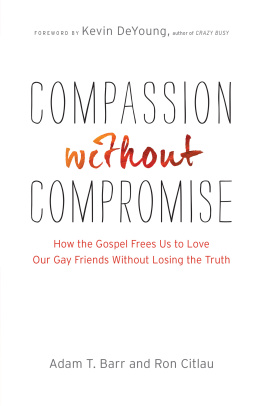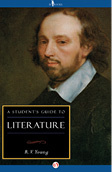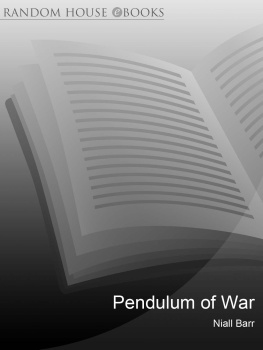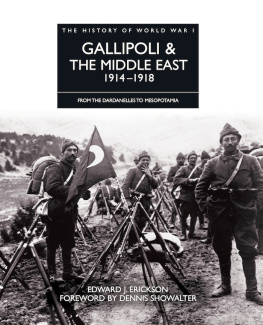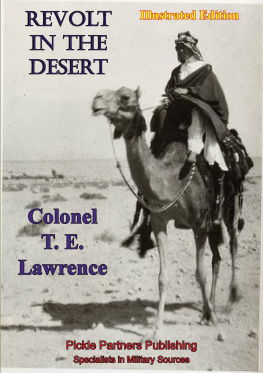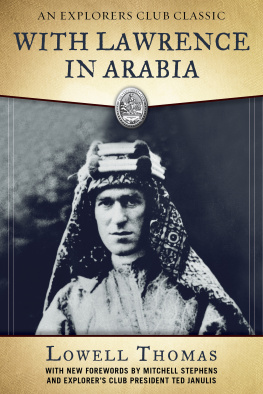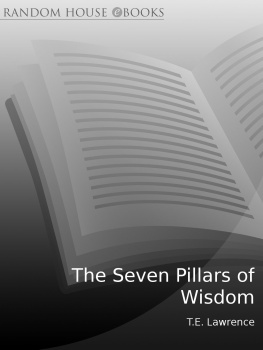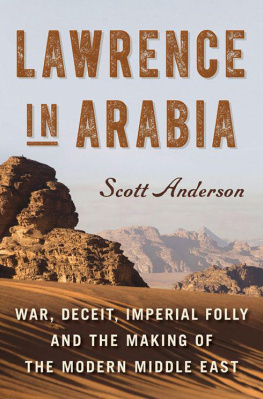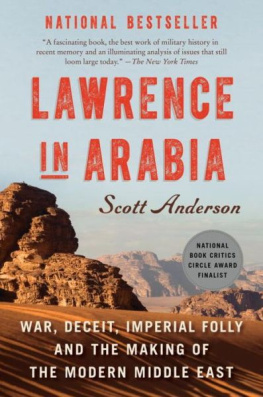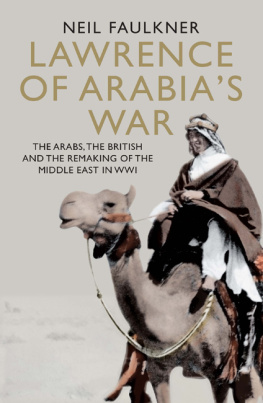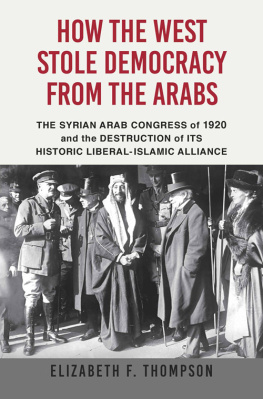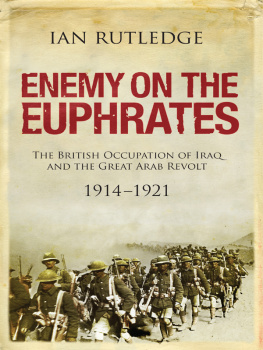The Bow Group: A History
SETTING THE DESERT ON FIRE
T. E. Lawrence and
Britains Secret War in Arabia,
191618
JAMES BARR

Grateful acknowledgement is made to copyright holders of material reproduced in this book, but if any have been inadvertently overlooked the publishers would be glad to hear from them and to make good in future editions any errors or omissions brought to their attention. For legal purposes the Acknowledgements and Illustration pages constitute a continuation of this copyright page
First published in Great Britain 2006
This electronic edition published in 2006 by Bloomsbury Publishing Plc
Copyright by James Barr 2006
The right of James Barr to be identified as author of this work has been asserted by him in accordance with the Copyright, Designs and Patents Act 1988
The moral right of the author has been asserted
All rights reserved. You may not copy, distribute, transmit, reproduce or otherwise make available this publication (or any part of it) in any form, or by any means (including without limitation electronic, digital, optical, mechanical, photocopying, printing, recording or otherwise), without the prior written permission of the publisher. Any person who does any unauthorised act in relation to this publication may be liable to criminal prosecution and civil claims for damages.
Bloomsbury Publishing Plc,
50 Bedford Square,
London WC1 3DP
A CIP catalogue record for this book is available from the British Library
ISBN 978 1 4088 2789 5
www.bloomsbury.com
Visit www.bloomsbury.com to find out more about our authors and their books You will find extracts, author interviews, author events and you can sign up for newsletters to be the first to hear about our latest releases and special offers
Contents
Lawrences photograph of the Arabs camp in the mouth of Wadi Yanbu at dawn, December 1916. (Imperial War Museum Q58838)
The British enter Jerusalem, 11 December 1917. (Imperial War Museum Q12616)
Abdullah ibn Husein (18821951) Huseins second son. The ambitious power behind his father, his own aspirations hinged on joining the Hijaz to Yemen and staving off the threat posed by Ibn Saud. Recognised by the British as Emir of Transjordan in May 1923, he was assassinated in Jerusalem.
Allenby, Sir Edmund (18611936) Commander-in-chief of the British Third Army in France from October 1915. Sent to Egypt in June 1917 following his perceived failure at Arras, he brought a sense of purpose to the demoralised Egyptian Expeditionary Force. Best known for capturing Jerusalem in December 1917. He served as High Commissioner in Egypt in difficult circumstances after the war, from March 1919.
Asquith, Herbert (18521928) British Liberal Prime Minister, 1908 until December 1916.
Auda abu Tayi (died 1924) Sheikh of the Huwaytat. Auda was an infamous raider well known to pre-war European travellers to the region. Outlawed by the Ottomans after he had murdered two tax collectors, to the British he seemed a natural supporter of the Arab revolt.
Balfour, Arthur (18481930) Former Prime Minister (19025) whom Lloyd George brought back as Foreign Secretary in December 1916. Published the Balfour Declaration in November 1917. Resigned in 1922.
Brmond, Edouard (18681948) Commanded an infantry unit in France before he was wounded, and then nominated as Chief of the French Military Mission to the Hijaz in August 1916, on the strength of his extensive pre-war experience in North Africa. Recalled December 1917.
Chamberlain, Sir Austen (18631937) Secretary of State for India May 1915 to July 1917. Initially against British intervention in the Hijaz, he increasingly feared the consequences if the Ottomans recaptured Mecca, and supported sending British troops. Forced to resign in July 1917 over a damning report into the failed Indian Army expedition to Baghdad which had met with disaster at Kut in 1916.
Clayton, Gilbert (18751929) Director of Military Intelligence at British Army Headquarters, 191416; in charge of the Arab Bureau and Hijaz operations 191617; Chief Political Officer in Egyptian Expeditionary Force 191718. Cautious, firm believer in the threat to Egypt posed by the Ottoman declaration of jihad.
Fakhreddin (Fakhri) Pasha, (18681948) Ottoman commander who was sent to defend Medina in late May 1916, following suspicions that a revolt was imminent. He held out until January 1919.
Feisal ibn Husein (18861933) Third son of Sharif Husein. The recipient of British support after showing a willingness to help the British that contrasted with the attitude of his two elder brothers. Forced out of Syria by the French in July 1919. Proclaimed King of Iraq in Baghdad by the British in August 1921.
Grey, Sir Edward (18621933) British Foreign Secretary, 190516. A dutiful, but increasingly uncertain, politician who willingly delegated responsibility for dealing with Sharif Husein to Henry McMahon in Cairo in 1915.
Haidar, Ali (18661935) Appointed Emir of Mecca by the Ottoman government in June 1916 to replace Sharif Husein. Returned to Lebanon in March 1917 after eight months in Medina.
Hogarth, David (18621927) Arrived in Egypt in August 1915. Director of the Arab Bureau from its creation in spring 1916 until that autumn. Hogarth was a veteran archaeologist who volunteered his services following the outbreak of war. He was instrumental in bringing Lawrence into intelligence work in Cairo. He opposed large-scale intervention in the Hijaz.
Husein ibn Ali (18531931) Appointed Emir of Mecca in 1908 by Sultan Abdul Hamid. Revolted against the Ottoman government in June 1916. Recognised as King of Hijaz in 1916, he abdicated in favour of his eldest son, Ali, in 1924. After Abdul Aziz ibn Saud overran the Hijaz in 1925, he spent the rest of his life in exile.
Ibn Saud, Abdul Aziz (18801953) Sultan of Najd, in central Arabia. Having captured Riyadh in 1902, he was allied to, and received assistance from, the British during the war. He defeated his rivals Ibn Rashid, 1921-2, and Sharif Huseins son Ali, in 1925.
Jafar Pasha al Askari (18851936) Ottoman Army officer, held prisoner of war in Cairo. He had been captured by the British in February 1916 during their suppression of the Senussis revolt, in which he was an agent provocateur. He was persuaded to serve with the Arab rebels, whom he joined in the summer of 1917. Born in Baghdad, he served twice as Prime Minister of Iraq, and several times as Minister of Defence between 1923 and 1936, when he was murdered in a coup.
Jaussen, Antonin (18711962) French priest turned archaeologist who had travelled in the Hijaz extensively before the war. He was unsurprisingly sucked into intelligence work during the war.
Jemal Pasha, Ahmed (18721922) Commander of the Ottoman Fourth Army and Military Governor of Syria from December 1914. A secretive man, he orchestrated efforts to win Sharif Huseins support for an invasion of Egypt and then, when these failed, a crackdown on nascent Arab nationalism in Syria, which earned him the soubriquet The Blood-letter. Recalled following the loss of Jerusalem, December 1917.
Joyce, Pierce (18781965) Egyptian Army officer. Arrived at Rabigh in November 1916, tasked with protecting the new British airfield, and effectively defending the village against Ottoman attack. Joyce rapidly became the organisational linchpin of operations in the Hijaz and at Aqaba. He was an adviser to the Iraqi Army after the war.
Next page

